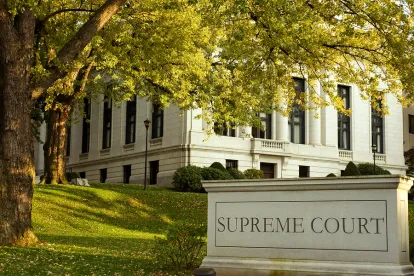On June 29, 2023, the U.S. Supreme Court announced its unanimous opinion in Groff v. DeJoy, No. 22-174, 600 U.S. __ (2023), a long-awaited decision explaining employers’ obligations under Title VII to reasonably accommodate employees’ religious beliefs, observances and practices. Groff, the first Supreme Court decision in nearly 50 years to consider what employers must prove in order to deny an employee’s request for an accommodation based on religion, establishes that employers must show that the hardship associated with granting a religious accommodation would result in substantial increased costs in relation to the conduct of its particular business.
Gerald Groff is an Evangelical Christian who devotes his Sundays to worship and rest for religious reasons and believes that Sundays should not be devoted to “secular labor” and the “transport[ation]” of “worldly goods.” He was also a postal worker for the U.S. Postal Service (USPS) for many years. As we all know, until the mid-2010s, the USPS did not deliver mail on Sundays, so, for the first few years of his employment with the USPS, Mr. Groff’s religious observations did not conflict with his duties. But that changed in 2013 when the USPS agreed to assist Amazon by facilitating Sunday deliveries. In 2016, the USPS and Mr. Groff’s union entered into an understanding regarding how Sunday and holiday parcel delivery would be administered and how postal workers would be permitted to volunteer, or, if necessary, required, to work on Sundays and holidays. After learning that he could be compelled to work on Sundays, Mr. Groff transferred from his Quarryville, Pennsylvania postal station to a small, rural USPS station in Holtwood, Pennsylvania, one with only seven employees which had not been selected to make Sunday Amazon deliveries.
Things were fine until March 2017, when the USPS added the Holtwood station to the Sunday Amazon delivery rotation. Mr. Groff refused to work on Sundays, so during peak delivery seasons, the USPS assigned Mr. Groff’s Sunday deliveries to the rest of the staff, including the Postmaster. During off-peak months, Mr. Groff’s Sunday assignments were redistributed to other carriers assigned to the regional hub that covered the Holtwood service area. Throughout 2017 and 2018, the USPS imposed progressively more serious discipline on Mr. Groff for refusing to work on Sundays, leading Mr. Groff to resign from the USPS in January 2019.
Mr. Groff then sued the USPS under Title VII of the Civil Rights Act of 1964, alleging that the USPS could have accommodated his “no work on Sunday” religious observance “without undue hardship on the conduct of [USPS’s] business.” The trial court sided with USPS; the U.S. Court of Appeals for the Third Circuit affirmed. The Third Circuit explained that it felt “bound by” the Supreme Court’s ruling in Trans World Airlines, Inc. v. Hardison, 432 U.S. 63 (1977), in which the Court held that requiring the employer – there, an airline – to accommodate a worker’s Sabbath observation was unreasonable. Observing that it read Hardison to mean “that requiring an employer ‘to bear more than a de minimis cost’ to provide a religious accommodation is an undue hardship,” Groff, 35 F.4th 162, 174 n.18 (3d Cir. 2022), the appellate court concluded that the USPS had satisfied its minimal burden by showing that exempting Mr. Groff from Sunday scheduling burdened his coworkers, “disrupted the workplace and workflow and diminished employee morale.” Id. at 175.
The Supreme Court agreed to hear Mr. Groff’s appeal and used the case as an opportunity to revisit and clarify its opinion in Hardison. Although Hardison was decided in 1977, it involved a dispute that arose before Congress’ 1972 amendments to Title VII. These amendments clarified that employers are required to reasonably accommodate employees’ religious observations and practices unless the accommodation imposed an “undue hardship.” To this point, the Court observed, Hardison involved a union member airline repair and maintenance worker who requested Sabbaths off following a religious conversion, but granting his requested accommodation would have required TWA to deprive senior employees of their seniority scheduling rights granted by the relevant collective bargaining agreement. The Supreme Court concluded that Title VII does not require an employer and a union who have agreed on a seniority system to deprive senior employees of their seniority rights in order to accommodate a junior employee’s religious practices; indeed, Title VII provides special protection for “bona fide seniority … system[s]” 42 U.S.C. § 2000e-2(h). Since the Court could not identify a way for TWA to accommodate Hardison’s request for a Sabbath work exemption without violating contractual seniority rights, and, without sufficient repair and maintenance staff working on Hardison’s Sabbath, TWA would have been short-handed and thus unable to perform its “essential” mission, the Supreme Court concluded that Hardison’s request could not be reasonably accommodated.
The Supreme Court observed in its Groff decision that Hardison has been unfairly reduced to a single, oft-quoted sentence: “To require TWA to bear more than a de minimis cost in order to give Hardison Saturdays off is an undue hardship.” Observing that lower courts – including the Third Circuit when it reviewed Groff’s appeal – have “latched onto” this language and conflated the undue hardship analysis with “de minimis cost,” Justice Alito wrote in the 9-0 majority opinion that Hardison cannot be reduced to a single phrase and must be viewed in its full and proper context, appreciating the “substantial” burdens that the specific accommodation requested (deviating from contractual seniority rights or operating without sufficient staffing) meant in the overall context of the employer’s business.
Therefore, the Court reminds us, an employer does not escape liability under Title VII merely by showing that an accommodation imposes some additional costs, but it must instead demonstrate that the “something hard to bear” is excessive or unjustifiable, akin to the “substantial additional costs” or “substantial expenditures” referenced in Hardison. Cautioning that reasonable accommodation is always a fact-intensive inquiry, the Court went on, not to announce a new test, but rather to clarify its existing but often misconstrued test for religious accommodation: When an employee requests an accommodation for religious reasons, an employer must show that the burden of granting the accommodation would result in substantial increased costs in relation to the conduct of its particular business, taking into account all relevant factors in the case at hand. This requires evaluating the particular accommodation(s) requested and their practical impact in light of the nature, size and operating cost of an employer.
In addition to harmonizing Groff with Hardison, the Court clarified several issues that it observed to be recurring legal questions in this area:
-
First, the Court underscored that Title VII requires an assessment of a possible accommodation’s effect on the conduct of the employer’s business. The impact of an accommodation on coworkers – such as the effect on morale from covering an employee’s shifts on his Sabbath – is only relevant to the extent that the effect on coworkers affects the conduct of the business. Hostility toward religious practices or accommodations is never a valid defense.
-
Second, the Court reminds employers that the goal of Title VII is to ensure that employers “reasonably accommodate” an employee’s practice of religion. Since the USPS only assessed the reasonableness of a particular accommodation and concluded that forcing other employees to work overtime would constitute an undue hardship, it failed to consider other options (e.g., voluntary shift-swapping) that may have enabled Mr. Groff to observe his religious practices.
Groff may come as a surprise to many employers that have come to believe that any trifling imposition on the business supplies a legally sufficient justification to deny a requested religious accommodation; indeed, even the EEOC’s regulations accept Hardison as prescribing a “more than de minimis cost” test. 29 C.F.R. § 1605.2(e)(1). Although the Court did not go so far as to adopt a test identical to the ADA’s undue burden test, it did come closer to that standard by clarifying that a religious accommodation must impose a substantial hardship to the conduct of the employer’s business – analyzing the reasonableness of the accommodation through the lens of employer size and resources – before it can be denied. With a recent spike in religious discrimination charges (many related to measures imposed during the COVID-19 epidemic) and an anticipated sharp increase in the number of Title VII religious accommodation cases sure to follow, the Court’s decision significantly shifts the landscape for employers.




 />i
/>i

